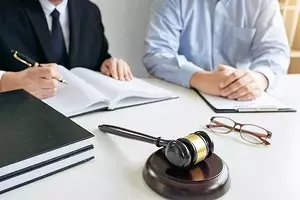With the problem of non-return, the debt faced, unfortunately, many. Everyone knows that the money taken "at the time" and "other people" is very quickly becoming their own. We tell about legal mechanisms for the protection of creditors.


Photo: shutterstock / fotodom.ru
If the debtor is in no hurry to return money, you should try to influence it by sending him written requirements (properly executed claim). In the event that the claim remains without attention, the lender remains only to go to court.
Receipt
Russian legislation allows for the possibility of transferring money between individuals on a receipt in accordance with Art. 808 Civil Code of the Russian Federation.
The receipt is a document that is provided to confirm the loan agreement, but it does not replace it. However, attention should be paid: in order to confirm the fact of transferring money to the lender by the borrower, a fairly simple written form of receipt.
The following indicates:
- F. I. O. Debtor and creditor;
- Date of Birth;
- Data on a document certifying the identity;
- registration and accommodation places;
- amount of debt (in numbers and in words);
- If the cash is given to a debt in foreign currency, we recommend to specify the exchange rate on the loan date (this will avoid misunderstandings and simplify the life of the borrower);
- If money is given in debt under interest, it must be specified;
- Money refund period (accurate date);
- Document preparation date;
- Signature of the borrower (you must compare the signature of the borrower on receipt and in the passport).
The receipt decorated in simple writing can be certified by the notary.
If by the time the deadline specified in the receipt, the debtor did not return the money (or did not ask for a postponement or installment of payment), it is necessary to send him a written demand for debt payment. To send it to the debtor needs to be ordered with a letter notice.
After 30 days from the moment of the presentation, the requirement should be sent by the debtor a written claim in which the consequences of non-payment of debt will be indicated. Such consequences, for example, may include an appeal to court with a claim.

Photo: shutterstock / fotodom.ru
Time limit for appeal to court
The statute of limitations for appeal to the court is 3 years since the estimated duty of the debt refund specified in the preparation of the receipt.If the date is not specified in the receipt, then the time starts after 30 days from the moment you demanded money back. Therefore, if the requirement of the debtor did not prevent the lender, then the statute of limitations did not begin.
Please note: in exceptional cases, the Civil Code of the Russian Federation allows us to extend the limitation period. The reason why the lender could not take advantage of his right to apply to the court should be a wig. For example, the court may decide on the extension of the statute of limitation if the lender spent several months in an overseas business trip or was healing in the hospital. If the debtor was hidden, this is a valid reason for the extension of the statute of limitations is not, because it does not prevent the lender to send the requirement to return the money by writing.
In addition, it is possible to interrupt the limitation period - for example, if the debtor recognizes the claims of the lender. Note that in court it will be necessary to submit or a new receipt, or a written response to your claims, or the documented testimony of witnesses (as a last resort, a notarized screenshot of the electronic correspondence), that is, the document from which it follows that a particular person recognizes the presence of debt.
If you do not want to contact the court, you can reinstall your right to demand a collector debt; In this case, after the conclusion of the contract, the lender will immediately receive a certain part of the amount, and he will not have to communicate more with the debtor or go to court.
Pre-trial decision
Agency for economic security, detective and security agencies, as well as collector organizations will help recover debts from individuals.
However, before contacting them for help, you need to make sure that they act on legal grounds.
Communicating with the debtor, the collector is obliged to introduce themselves and call the company in which it works, and its location, and also explain the interests of which lender it represents.
The collectors have the right to negotiate with the debtor on the phone, writing and personally, but only in the interval from 8:00 to 22:00 local time on weekdays and from 9:00 to 20:00 on weekends and holidays.
Collectors do not have the right to be to the debtor home or at the place of work without its voluntary consent.
The interests of the debtors, for whom collectors often behave incorrectly, protects the federal law of July 3, 2016 No. 230-FZ "On the protection of the rights and legitimate interests of individuals in the implementation of overdue debts."
When there are no written or oral agreements on the time of returning the amount of the debt, the procedural term (time during which one can file a claim) is counting from the moment the debtor receives the requirements that must be sent by the custom letter with the notice of the presentation.

Photo: shutterstock / fotodom.ru
How to go to court
To go to court, you need to create a statement of claim. This can be done independently, but, as practice shows, there are large chances of a positive solution for those lenders who use the help of lawyers.The choice of court (general jurisdiction or world) depends on the amount of the claim. You can contact the World Court if the amount of debt does not exceed 500 thousand rubles.
The claim must be applied to the document confirming the transfer of money by the lender by the debtor, as well as a receipt for the payment of state duty.
If the defendant does not dispute the facts mentioned in the receipt, the court for 3 months decides to recover the amount of debt and percent on it.
The return of debt can be attracted by bailiffs, which first offer the debtor to voluntarily repay the debt, otherwise they proceed to the arrest of property, are submitted requests for bank accounts.
Please note that things are far from always being solved promptly. It happens that the debtor is not in court, tightening the consideration of the case. It happens like this: the debtor challenges his own fully executed receipt. The court decision depends on what evidence of the transfer of money is available in the case. Perhaps it will be necessary to assign relevant examination if, for example, the debtor will declare that the signature does not belong to the receipt. The costs of conducting an examination will bear the debtor (if it decides in favor of the creditor).
In the event that the court submitted a positive decision in favor of the creditor, the decision is based on its entry into force. The lender receives an executive list in court and transmits his bailiff for the initiation of enforcement proceedings. The attractive guides the debtor appropriate decree.
The debtor has the right to voluntary debt payment within five days. Next to it will be applied for compulsory measures. Such a measure may be, for example, the imposition of arrest on the existing property of the debtor.
Proving the fact of transferred by the creditor of money the borrower without receipt is difficult, but it is possible: to justify the claim, it is necessary to carefully collect all the existing evidence (for example, correspondence with the debtor, the testimony of the money being transmitted).
Alternative to the claim
The lender may apply to the court not with a claim, but with a statement on the issuance of a court order, which will be issued to the applicant together with the executive list. This is the basis for the initiation of enforcement proceedings by bailiffs.
To make a judicial order, a lender is needed with documents attached to it confirming the fact of transferring money to the borrower.
The advantages of the judicial order are that the trial will not, the search for the debtor will not need and his call to the court. In addition, the size of the state duty in this case will be 2 times less than when the claim is submitted.
However, there are also cons. The debtor has the right to challenge the judicial order within ten days after it is received. In this case, the order will be canceled, but this does not deprive the lender right to apply to court - now with a suit.
How to reduce the amount of debt
Reduce the amount of debt can be completely legal. For this, the following financial instruments can be used.
- Refinancing a loan (obtaining another loan to cover the old and its design on more acceptable conditions), which can be obtained both at the bank bank and in a third-party banking institution.
- The restructuring of the debt (change in the terms of the loan payment) on the application of the debtor is possible in the presence of heavy life circumstances, such as loss of work, long-term illness.
- Obtaining insurance under the loan agreement (obtaining the amount of insurance indemnity provided for in case of loss of work, disability loss, etc.), if such an opportunity has been provided for (taking into account that it takes time to verify the documents and accrual of payments).
- Registration of a new loan for repayment of the current (the borrower independently refers to an overview bank for a new loan to repay the previous one).
- Appeal to anti-colleverters (an organization that takes on all the work to resolve the situation with the lender and even represents the interests of the defaulter in court). In order not to make a job in a financial deadlock, it is necessary to proceed as early as possible to resolve the situation.

Photo: shutterstock / fotodom.ru
Sanctions against debtors
Being a debtor and defaulter means to deprive himself the possibility of going abroad. Since such a sanction can touch back even law-abiding citizens who return debts on time (for example, registered on the living space of relatives, but a citizen living separately in the most responsible moment can learn that the apartment has accumulated communal payments).
The lender - the tax authorities, the credit institution, the management company - appeals to the court. Having considered the application, the judge issues a judicial order for the recovery of the sum of money and sends it to the federal bailiff service, where executive production is started. After that, the bailiff has the right to make a decision on the temporary ban of the departure of the Russian Federation, which must be sent to the debtor by mail or is presented personally; At the same time, information is transmitted to the FSB of Russia's border service and is entered into the database. Outcome: on passport control at the airport or other paragraph, the debtor will not be allowed to leave the country.
If the amount of debt does not exceed 10 thousand rubles, there are no reasons for concern. We draw your attention to the fact that the decision is made by the bailiff in each particular case, therefore, sometimes the existence of debt in the amount of more than 10 thousand rubles. Will not lead to an indispensable restriction on leaving abroad. The decision takes a bailiff, which is managed by the debtor.
In order not to be in an unpleasant situation, do not forget when planning a foreign voyage on the FSSP website (FSSprus.ru) to check whether the enforcement proceedings are not included in your debts. Note that the ban on departure is removed within ten days after repayment of debt (however, if your trip is dictated by a medical necessity, the term can be reduced to one day).
In order to make sure that the restriction on the departure is removed, it is recommended to send a request to the site of the border service (PS.FSB.RU) (official response will not come soon: it usually takes no less than 10-12 days, so count the time before the trip) . Please note: the presentation of the receipts on the transfer of debt amounts or even copies of the FSSP resolution on temporary restriction on departure will not help, since the Border Service uses its own database, to make information into which the time will also need.
If the debts are repaid, the decision to remove the restriction on the departure is in hand, however, due to the inconsistency of the FSSP actions and the FSB of the FSB of Russia, you refused to go beyond the country, boldly see the court. Evidence - Documents confirming the payment of the tour, air tickets, as well as the evidence of a failed attempt to check out - boarding passages for the flight, a written refusal of the border service to release outside the Russian Federation.
